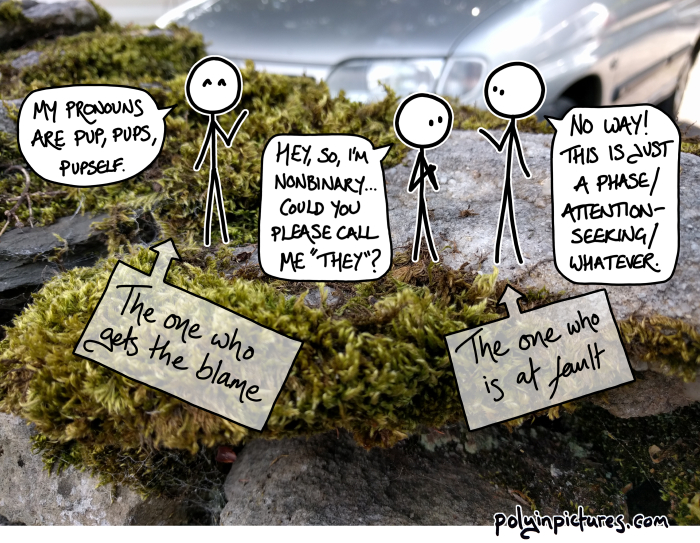231. Responsibility
This is super topical because I’m running a survey about pronouns, which you should check out if you’re nonbinary. 🙂
Part of why I’m running this survey is because there is this ugly undercurrent in LGBTQ+ communities: a tendency to blame the next group down on the food chain, scapegoating them and pushing them under the bus to make themselves look more legitimate. Gay folks exclude bi folks for not picking a side, and trans people trash nonbinary people for being confusing or whatever, I don’t know. In the nonbinary world, folks with more “mainstream” pronouns blaming folks with less common pronouns (like people whose pronouns are neopronouns, otherkin, anyone a little more “out there” than they are) for the rest of the world failing to accept and include us.
The truth is, if you come out to someone, but instead of listening to you and trying to empathise with your experiences they refuse to accept you for any reason – including “I heard that a friend of a friend uses pup/pupself pronouns on the internet between close friends and I think that’s ridiculous and I therefore think you’re ridiculous” – then the problem is that the person you came out to is an insensitive gitwizard.
Don’t resent your trans and nonbinary siblings for binary people’s lack of acceptance, my friends! Empathy with each other and with binary people is the way forward.
Much appreciation to everyone who pledges on Patreon, including the very kind Lyrania, Martina and Lorelei!




I knew someone who met someone who wanted to be addressed as ‘she’ in the accusative and ‘he’ in the genitive. As in, “She owns that book. It is he book.” This I take issue with.
Blimey, that does sound very hard to keep up with!
Having a native language that totally lacks grammatical genders I have mixed feelings about this personal pronouns controversy. On the one hand I understand not being comfortable with the pronouns people use in connection with you, on the other hand why not just introduce a set of genderless pronouns which are applicable to anyone and anything by definition and be done with it. Please, English speakers, examine Hungarian for example.
Also, imagine the horror of Germans if they started to play with this whole grammatical gender thing. In German articles, pronouns and even adjectives have different declensions in different cases and genders.
Alas, it is harder than it sounds! If you’ve grown up with a pronoun set that is gender neutral it must sound very easy. But in English pronouns are a closed class, which means it’s really really hard to learn new pronouns. Contrasted with nouns, which are an open class – people are capable of learning dozens or even hundreds of nouns in a few days or weeks. Loads of nouns are added to the English dictionary every year, but the last time we got a new pronoun it was the second-person pronoun “you” being adapted for talking about an individual – it used to be used for multiple people and formal situations only. And that was hundreds of years ago, I think?
So yeah, learning new pronouns is really hard! If I could use singular they to talk about everyone I would, but a lot of people feel uncomfortable with having their genders erased and would rather have gendered pronouns. It’s a tricky issue.
Well, I guess it will take a few hundred years to completely solve this issue then. Maybe fewer if the educational system teaches the new way consistently. Young minds are more open to new ideas and attitudes.
Depending on where you are, singular they is taught as a totally fine and valid pronoun for people of unknown gender. People and society move much faster than education, though. We’ve been using singular they for a very very very long time – as long as English started to be written down back in the days of Chaucer. The tricky part is shifting so that we can use singular they for people of *known* gender, and that’s happening now as nonbinary people are coming out and getting social recognition and acceptance.
So, once upon a time we’d use “you” for multiple people or for an individual in a formal setting, and we’d use “thou” for an individual in an informal setting. Then there was a gradual shift, and now we say “you” when we’re talking to anyone, to any number of people. It does seem plausible that “they” could very very slowly shift to replace gendered pronouns, in the same way that “you” has replaced “thou”. But yes, it would take hundreds of years, probably! Because it’s a closed class. Thankfully everyone has already been raised with singular they in their vocabulary fluently, and this generation of kids will grow up knowing that singular they is a popular pronoun for nonbinary people too. So at the very least, I will see many more people’s genders respected in pronoun form in my lifetime. 🙂